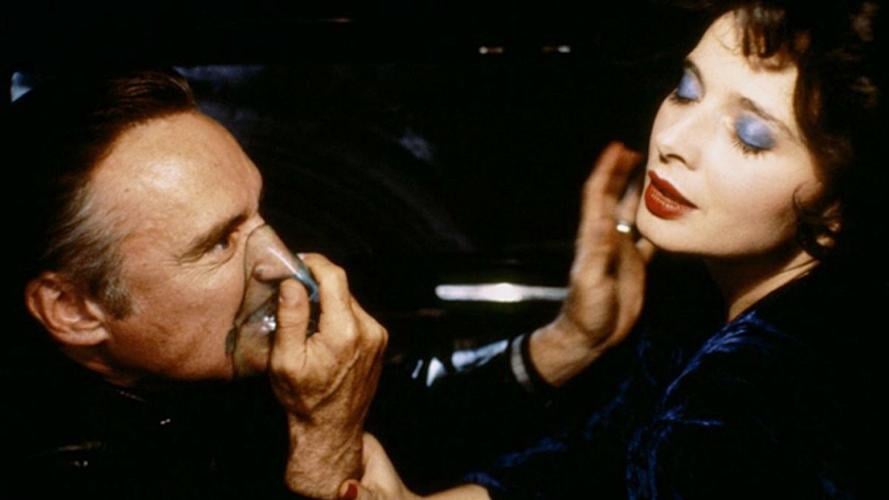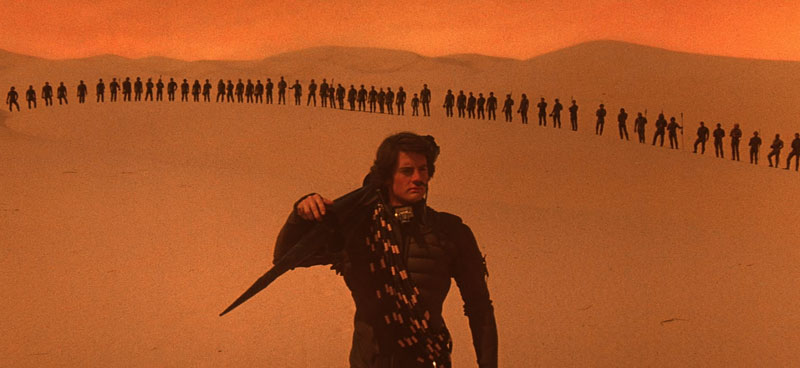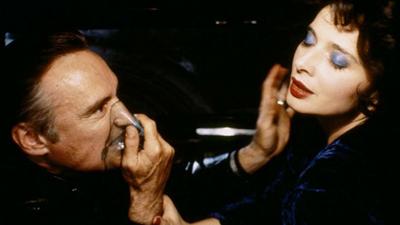With the feverishly anticipated 18-episode Twin Peaks redux slated to premiere on Showtime later this month, many a David Lynch fan is getting a bit antsy. After all, it’s been a decade since the Peaks creator and massively influential weirdo auteur released a major work. Unless of course you count his albums, which — for the purpose of this article, anyway — let’s not.
The Belcourt is here to scratch your weird cinematic itch with its “David Lynch: A Retrospective” May 5-17. For Lynch acolytes, this is an opportunity to gorge on all 10 of the notoriously eccentric postmodernist’s features — not to mention six of his short films, which will show throughout the series, as well as Jon Nguyen’s 2016 documentary David Lynch: The Art Life (showing May 11-14). But for the uninitiated, Lynch’s catalog can be a daunting and perhaps confusing one. “Lynch” is a name that has become synonymous with the avant-garde — the freakier side of cinema, where the subconscious reigns and a gas-huffing, dry-humping Dennis Hopper isn’t even necessarily one of the more outlandish villains.
And so we at the Scene — that is, managing editor D. Patrick Rodgers and freelance contributor/cinephile/Belcourt staffer/Lynch expert Jason Shawhan — have turned our conversation about the avant-garde nature of Lynch’s oeuvre into a handy little user’s guide. Below, see our thoughts on each of Lynch’s 10 films, along with a weirdness rating system devised via unscientific polling (thanks Twitter!) and our own opinions. For more on the series, including show times and ticket prices, visit the Belcourt's site.
Eraserhead (1977)
Screening: May 5-6
Synopsis: Lynch’s surreal, nightmarish black-and-white debut — called “unwatchable” by Variety at the time of its release — posits that fatherhood is not a blessing so much as a grotesque curse.
How Weird Is It? 10/10 aesthetically; 3/10 thematically
DPR: Jason, I think you’re right that — while Eraserhead aesthetically seems very art-schooly and avant-garde — conceptually it really is pretty basic. “Bro-y,” to borrow your term. It’s about fear of commitment after all, right? Pretty straight-ahead stuff thematically, even if it does feature a repugnant creature as a stand-in for a newborn.
JS: Yes. And Lynch is also on record about it being related to the horror of being a parent. His daughter seems to have let that slide.
The Elephant Man (1980)
Screening: May 6-7
Synopsis: Based on the true story of famously disfigured Englishman Joseph Merrick, The Elephant Man — also in black-and-white — was Lynch’s breakthrough film.
How Weird Is It? 4/10
DPR: Since this was Lynch’s big break, it was sort of him trying to tell a story conventionally. It’s pretty sentimental and moralistic, wouldn’t you say?
JS: It’s conventional in that it’s a true story. But it does a phenomenal job of capturing the values of that time in European history. It’s an indictment of so-called High Culture for acting as if it’s transcended its freakshow impulses. Though it’s also worth contrasting John Merrick — which he is named in the film, rather than Joseph Merrick — with Saartje Baartman, the “Hottentot Venus.”

Dune (1984)
Screening: May 7 & 9
Synopsis: Based on Frank Herbert’s beloved 1965 hard sci-fi novel of the same name, Dune features an ensemble cast including longtime Lynch collaborator Kyle MacLachlan, Sean Young, Patrick Stewart and, yes, Sting.
How Weird Is It? 5/10
DPR: I mean … an advanced, complex, incredibly unwieldy sci-fi story that Lynch did his best to interpret, and most people saw as a failure. But the scope alone is impressive and intoxicating, if perhaps too much to take in.
JS: Cinematically, Dune is the Kobayashi Maru of sci-fi. It’s one of, if not the, most acclaimed sci-fi novels ever, and it’s far too dense to make a two-hours-and-change adaptation of. But Lynch gets so much of it magnificently right. I’ve read all of the books in the Dune-iverse, and Lynch’s film is the visual template for inside my brain. The textures and architecture are spot-on.
Blue Velvet (1986)
Screening: May 7 & 11
Synopsis: MacLachlan is back, this time as a nice young kid who discovers a severed ear, which eventually leads him to the aforementioned gas-huffing, dry-humping Hopper character.
How Weird Is It? 9/10
DPR: Finally, Lynch debuts as a noir director, a postmodern storyteller. While the characters are pretty fucking singular, it really isn’t all that unconventional from a storytelling perspective. Right? A challenging watch, sure, undoubtedly — it’s disquieting. But it’s set up like an old mystery flick.
JS: Blue Velvet is deeply challenging in its depiction of sadomasochism, as well as the behind-the-scenes drama between Lynch and Rossellini. It’s also one of Dennis Hopper’s greatest performances.
Wild at Heart (1990)
Screening: May 7 & 12
Synopsis: Ironically enough, despite it being Lynch’s only collaboration with noted weirdo Nic Cage, Wild at Heart is remarkably straightforward. A conventional pulpy road romance, as straight as Lynch can tell it.
How Weird Is It? 2/10
JS: It’s a “good bad boy gets out of prison to reclaim his lady, but her family just can’t approve, so they have to go on the run” movie. Mixed in with assassins, mysterious syndicates and The Wizard of Oz. Nicolas Cage even sings “Love Me Tender” in it. Along with Mad Max Fury Road, Wild at Heart is the best Elvis movie ever made. Once you look at it that way, it just can’t be unseen.
Twin Peaks: Fire Walk With Me (1992)
Screening: May 12-14
Synopsis: A prequel to the Twin Peaks television series, Fire Walk With Me is a true horror film, following the last days of Laura Palmer.
How Weird Is It? 6/10
DPR: So different tonally from the series. I wasn’t old enough to (be permitted to) see it when it came out, and don’t really know what the reaction was like, but I personally find it to be Lynch’s most unsettling, and so much more conventionally presented than the series.
JS: People were so psyched. And it was devastating to see the film grind that audience down. That R rating allowed people to realize what ABC was terrified of: Twin Peaks, the series, the phenomenon, was built on the abuse and murder of Laura Palmer. It and Alien 3 that same summer were the films that kickstarted my having taste in film. And while I have always loved FWWM for its operatic passions, openhearted sympathies and supernatural expansiveness, it’s been interesting to talk to viewers who interpret the film outside of the show’s universe. Where it depicts the dissociative means by which the Palmer family metabolizes years of sexual and emotional abuse, and BOB is just the face put on a horror that countless families have had to deal with. People have always responded to Laura Palmer.

Lost Highway
Lost Highway (1997)
Screening: May 13-14
Synopsis: Fred (Bill Pullman) is is put on death row for the murder of his wife Renée (Patricia Arquette). In his cell, Fred shape-shifts into a young mechanic. Hijinks (read: very unsettling events) ensue.
How Weird Is It? 8/10
DPR: I kind of see this as the Lynch first glimpsed in Blue Velvet, but now fully realized. You called this “Lynch’s O.J. movie”? Talk to me about Robert Blake’s role.
JS: Lost Highway is the first of Lynch’s psychogenic fugue movies. Here it’s about how you can love someone and also kill them; how the most visceral emotions feed into one another, and how everyone has dissociative tendencies — some to survive, some to kill. Robert Blake’s character, the Mystery Man, carries a camera (the only objective viewpoint in the film) even as he incarnates sexual jealousy and doubt. He is everywhere, unbound by time or space, but he also only goes where he is invited. But Blake’s subsequent murder trial has added a whole other element of horror to the film and its thesis.
The Straight Story (1999)
Screening: May 14 & 16
Synopsis: Co-written by Lynch’s longtime collaborator and romantic partner Mary Sweeney, The Straight Story depicts the real-life events of Alvin Straight, who drove his lawnmower for six weeks and 240 miles to visit his ailing and estranged brother.
How Weird Is It? 1/10
JS: Though rated G, The Straight Story is just as emotionally devastating as any of Lynch’s other films. It’s accessible, if a little deliberate in its pacing. But it’s one of the few films I’ve ever seen that honestly reckons with what it means to be old — to have accumulated so much time, and so many decisions. Regret is a big theme in Lynch’s films, but it’s often tied to murder, or trespass, or something irrevocable. And The Straight Story, especially when you read about how star Richard Farnsworth was suffering in secret during its making, is a rejection of macho foolishness. It believes in forgiveness, and atonement, and it does so with the deepest sincerity. Sincerity is not a quality one finds in conventional movies.
Mulholland Drive (2001)
Screening: May 14 & 17
Synopsis: Initially conceived as a television pilot — TV executives wouldn’t touch it — Mulholland Drive was labeled a “poisonous valentine to Hollywood” by The Village Voice’s J. Hoberman. Long and convoluted, Lynch’s “love story in the city of dreams” came with a note card with 10 clues geared at helping explain the film when it was released on DVD.
How Weird Is It? 8/10
DPR: I see this as Lynch’s most superficially avant-garde film. It’s a riddle with no answer, seemingly designed to piss off squares. And Hollywood. Hollywood squares? Anyway, I enjoyed it — particularly our old pal Billy Ray Cyrus’ performance.
JS: The first time I watched MD, I didn’t care for it. It seemed like a less successful take on Lost Highway’s caesura cinema. It was a salvage job with a few good scenes, but its uncertainty as to what it was was deeply limiting. Now, after many more viewings, I think it’s a damn masterpiece. It is its own subgenre of film, one that I often refer to in my reviews, whenever a film makes the viewer come to terms with the absolute moral truth of themself. Mulholland Drive is a dangerous film in that it refuses to let anyone who engages with it escape — despite intentions, despite kindnesses past, despite all the conditional and subjunctive you can throw at a situation — we can’t lie to ourselves.
Inland Empire (2006)
Screening: May 10
Synopsis: Lynch’s first feature shot using standard-definition digital video, Inland Empire — which Peter Travers once called “hallucinatory brilliance” — is yet another collaboration with frequent leading woman Laura Dern. This time, she’s an actress who begins to take on the personality of one of her characters.
How Weird Is It? 10/10
JS: Lynch’s weirdest. There was never a specific script encompassing the project. It’s whatever he felt like doing at the time, written the day of (or just before). There’s bits of his web series Rabbits mixed in, and several mini-stories that recur. It’s the multiple characters and interlocking narratives with Laura Dern that give it any structure at all, and even then, they are exploring their own spaces. The main unifying aspect of it is the camera he used to make it.








